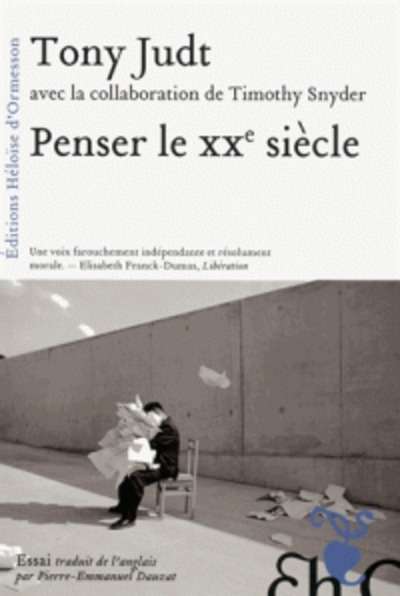Penser le XXe siècle

Editorial Héloïse D' Ormesson
Fecha de edición junio 2016 · Edición nº 1
Idioma español
EAN 9782350873374
528 páginas
Libro
Resumen del libro
"Ce livre tient de l'histoire, de la biographie et du traité d'éthique. Il est une histoire des idées politiques modernes en Europe et aux Etats-Unis. Ses thèmes sont le pouvoir et la justice, tels que les ont compris les intellectuels libéraux, socialistes, communistes, nationalistes et fascistes de la fin du XIXe à l'aube du XXIe siècle. Il est aussi la biographie intellectuelle de l'historien et essayiste Tony Judt, né à Londres au coeur du XXe siècle, juste après le cataclysme de la Seconde Guerre mondiale et l'Holocauste, et alors même que les communistes asseyaient leur pouvoir en Europe orientale.
Il est enfin une contemplation des limites (et capacités de renouveau) des idées politiques, ainsi que des échecs (et devoirs) moraux des intellectuels en politique." Timothy Snyder. Penser le XXe siècle dresse un vaste tableau de la politique des idées, guidant savamment le lecteur â travers les débats qui ont défini notre monde.
Biografía del autor
x{0026}lt;P x{0026}lt;B Tony Judt x{0026}lt;/B (Londres, 1948-Nueva York, 2010) realizó sus estudios en el King's College de Cambridge y en la École Normale Supérieure de París. Impartió clases en las universidades de Cambridge, Oxford, Berkeley y Nueva York, y en esta última ocupó la cátedra de Estudios Europeos, que él mismo fundó en 1995, y fue director del Remarque Institute.Entre sus publicaciones cabe destacar x{0026}lt;I El peso de la responsabilidadx{0026}lt;/I (Taurus, 2014), x{0026}lt;I ¿Una gran ilusión?x{0026}lt;/I (Taurus, 2013), x{0026}lt;I Pensar el siglo XXx{0026}lt;/I (Taurus, 2012), x{0026}lt;I El refugio de la memoriax{0026}lt;/I (Taurus, 2011), x{0026}lt;I Algo va malx{0026}lt;/I (Taurus, 2010), x{0026}lt;I Sobre el olvidado siglo XX x{0026}lt;/I (Taurus, 2008), x{0026}lt;I Pasado imperfectox{0026}lt;/I (Taurus, 2007), x{0026}lt;I Postguerrax{0026}lt;/I (Taurus, 2006), considerado uno de los diez mejores libros de 2005 por la x{0026}lt;I New York Times Book Reviewx{0026}lt;/I , galardonadocon el Premio Council on Foreign Relations Arthur Ross y finalista del premio Pulitzer, y x{0026}lt;I Cuando los hechos cambianx{0026}lt;/I (Taurus, 2015). Judt colaboró en diferentes medios de Europa y Estados Unidos, como x{0026}lt;I The New York Review of Booksx{0026}lt;/I , el x{0026}lt;I Times Literary Supplementx{0026}lt;/I o x{0026}lt;I The New York Timesx{0026}lt;/I . En 2007 recibió el Premio Hannah Arendt, y en 2009 el Orwell Prize for Lifetime Achievement. Falleció en agosto de 2010 a causa de una enfermedad degenerativa.x{0026}lt;/P








